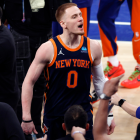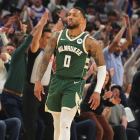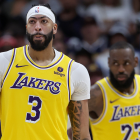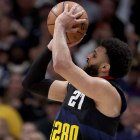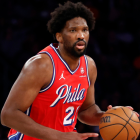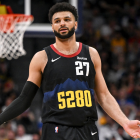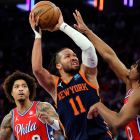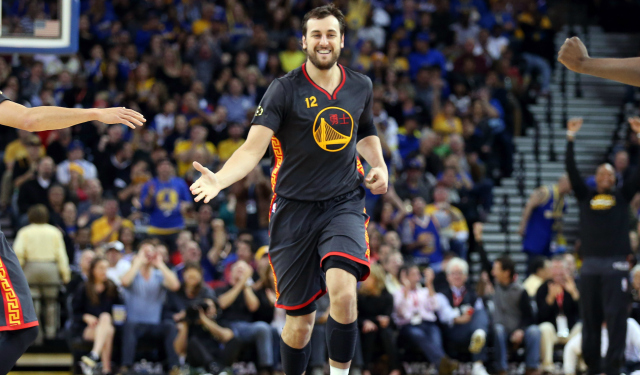
Professionally, life is grand for Andrew Bogut. On Monday, his league-best Golden State Warriors won their 53rd game of the season and clinched a playoff spot. There wasn’t much of a celebration — they let the lowly Los Angeles Lakers hang around for far too long — and the players hardly reacted when they received a standing ovation with the word “CLINCHED” on the Oracle Arena video board. On Tuesday, he spoke to us after finishing a typical practice ahead of an atypical game: a potential NBA Finals preview against the Atlanta Hawks.
“We watch film at the start of every practice,” Bogut said. “They do the last game, they’ll do the next game and they’ll probably have little joke things on there — whether you fell over in a game or did something stupid or whatever it is, something funny to make the guys laugh. Then we warm up and every time we warm up we have music blaring. We have a state-of-the-art speaker system they put in this year on behalf of Steve Kerr. He’s huge on having music playing while we’re warming up and getting loose. It kind of engages your mind.”
The Warriors blew out the NBA’s only other 50-win team on Wednesday. Bogut didn’t score a single point, but he completely controlled things defensively. As he said in the half-hour conversation, the 10-year veteran is more than pleased with both his role and the results in Golden State. The following Q&A, which covers Bogut’s journey, his motivation and much more, is lightly edited for clarity and flow.
I. “Everyone’s gunning for you.”
What are the challenges that come with being the frontrunners?
Everyone’s gunning for you. Last night we played a Lakers team who is not having a great year and has a pretty bad record but they pushed us to the end. Because a lot of teams are coming into town and, whether we go there or they come here, they are going to give us the best shot because we’re the best team in the league. We definitely have to approach games with a different mindset at times.
How many bad games have you had?
We’ve lost some games, probably four or five of our games that we lost we just got beat by a better team. San Antonio at home early on. But then the rest have been us making mistakes or not playing to our strengths. And we’ve also had wins like that as well. We’ve had wins where we deserve to win by 20 or 30 and then we’ve had wins like last night -- probably at times didn’t deserve to win, but we grinded it out and snuck one home. It definitely works both ways.
Are there times when the winning locker room doesn’t even feel like a winning locker room?
Oh, definitely. We’ve had times where you come in the locker room and it’s been just like we lost by 30. I think at New York was one of them. We had a big lead and we let it go and we were kind of messing around a little bit.
You have to understand and remember that no one’s judging style points for a win. They’re going to be ugly sometimes. Sometimes they’re not going to be the best-looking. But that’s the sign of a good team when you can grind out wins and not play your best basketball. So we’re definitely having those times. I think that’s definitely a good stepping stone, a building block for a good team, is to actually get wins and still be disappointed.
In a long season, how important is it for coaches and players to have a sense of humor?
It’s very important. I’m a big one for joking around and being sarcastic. I think most of the guys are, and the coaching staff. We have a coaching staff that takes things seriously when the lights comes on and we’re out there, but at the same time they can laugh at themselves, laugh at other people. I think that’s very, very important. You want to have a coach that’s strong and firm but you don’t want to have a drill sergeant that you can’t even crack a smile at. I think it’s a very fine balance and I think this coaching staff epitomizes it.
We have all kinds of competitions. Over Super Bowl weekend, we had a football competition. We had to run routes and you have to throw it and catch it and you get points based on whether you caught the ball with your partner. Different things like that. I think you want to keep things loose, and that’s definitely where Coach is so smart. He knows it’s a long season, it’s a roller coaster, it goes up and down. The last thing you want to do is hate coming to work, which happens a lot in NBA teams and pro sports.
I want to bring up a couple of guys and you can tell me what they mean to the team. First, Alvin Gentry.
He’s been huge. Basically he’s our offensive coordinator, like it would be in football. His main role is with reads and spacing and putting in sets, little tweaks. He’s highly responsible for that and does a great job. Unfortunately for us, I hate to say it but there’s a high chance we lose him in the offseason because he’s just too talented of a coach to not be head coaching.
Iguodala’s my locker partner. He’s right next to me in the locker room. He’s a great intangibles guy for us. This is a guy who was an All-Star at one point and put up huge numbers scoring-wise, but he accepted his role. He’s the leader of our bench. He’s probably one of our highest basketball IQ guys on our team and one of our best defenders. He brings a lot of things that some other guys don’t have on the team that he’s willing to do. He’s been absolutely huge for us.
Do you think people understand what kind of a sacrifice it is for someone like him or yourself to accept lesser roles?
It is what it is. And that’s drilled into the fans, with fantasy games and fantasy points and it’s all about numbers and averages. I mean, at this point in my career, I’m more about letters and they start with W. So, I think it’s a fine line and some guys can’t handle that. There are guys who would rather average 20 on a bad team than average 10 on a good team. And that’s just the reality of the NBA. I really don’t care. I know my role on this team and why we’re winning and the things I’m doing. And I think Andre does too. I think we’ve come to realize that, hey, it was cool averaging 16, 17, 18 points a game and get knocked out in the first round of the playoffs or not even make it to the playoffs, but it’s much cooler to have a chance to compete for a championship.
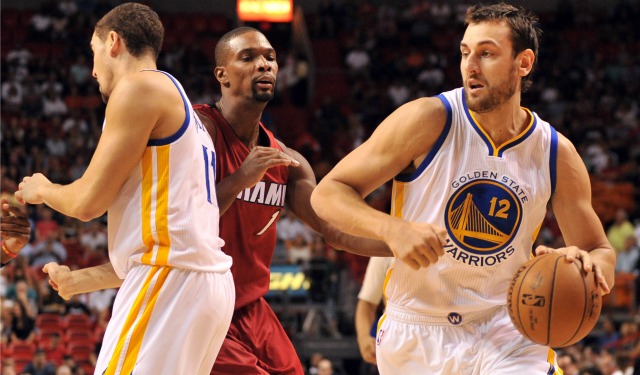
II. “I thought it was a pipe dream at best.”
Patty Mills called you “the face of Australian basketball.” What’s that like?
It’s surreal. My goal as a young fella was to play in the national league in Australia. I never thought it would be possible to play in the NBA. I thought it was a pipe dream at best. I didn’t think it was achievable. But I kept working at my game and getting better and better and ended up getting over here. But yeah, it is surreal, coming from a small little country like Australia that wasn’t known for basketball and to be still playing 10 years in in the best league in the world is a huge honor.
You have a basketball academy over there. What’s your role with the future of Australian basketball?
There needs to be a solid direction with where the national league is going, first and foremost. There’s been some drama there in the last month or two. Do I want to be involved with that? Who knows. I’ll reevaluate that when I’m done. But I definitely want to try to help the game. It’s such a shame to see 6-700,000 kids playing basketball every weekend around Australia and they don’t have local heroes to look up to. So I think that’s very important. So I look to get involved, maybe, down the track. We’ll see what happens.
How do people react when you — a 7-foot professional athlete — say that you were bullied when you were a kid?
People just brush it off. I mean, it’s the same as when I come over here and I tell people that I’m from a poor area in Australia. People in the NBA laugh it off and say, ‘You know, you’re a big white guy from Australia, you can’t be poor.’ I didn’t grow up in a prestigious, beautiful area in Australia. It was a lower, working-class suburb that was rough-and-tough, had a lot of crime. With the bullying, it’s the same thing. People see you now and you’re 7-foot and 265 and say, “That’s impossible.” But I wasn’t always 7-foot. I was 6-8 and probably 195 and I was in seventh grade and kids in 10th and 11th thought I was older than I was and were going after me. I had to kind of stick up for myself. So it helped my journey to where I am today and I wouldn’t change it for the world, but at the same time, as a kid going through adolescence, it was kind of hard to understand and hard to comprehend.
Growing up in Australia, were you the only kid who loved basketball in your group of friends?
Yeah I was, pretty much. I mean, look, we had a lot of guys who liked basketball, played it, but no one really that in love with it. Back when they had 56k modems, I was on NBA.com waiting for the statistics to load, which took three or four minutes, and printing ‘em out and taking ‘em home. I always loved it. Australia’s a little different with basketball. The junior sport is really doing well, but yeah it was kind of hard. It was mainly Australian Rules Football. Especially in Melbourne.
How do you watch a game differently than the average person?
Generally I’ll follow the guys that I’m going to be guarding for most of a game. And then, for instance, if we’re playing OKC, I will know Steven Adams’ habits and Enes Kanter’s habits and then also try to key in on their best player, Russell Westbrook, and try to figure out where he likes his shot. So if I do pick and roll coverage, have a look at what he’s doing out of the pick and roll, whether he splits the middle, whether he likes to pull up going right, whether he likes to drive left. And just try to remember those tendencies going into the game when we play them.
Can you ever just watch as a fan?
You’re critical and analytical straight away. Oh, I would have done this, or why did they do that? You can’t, you never really sit back and enjoy it for what it’s worth. And that’s an unfortunate consequence of playing professional sports is you’re always taught to overanalyze and overthink and critique. I can’t sit down with some popcorn and just watch a basketball game. That’s why there’s some nights I don’t even watch it because I just want to get away from it. Otherwise I know I’ll just be sitting there thinking.
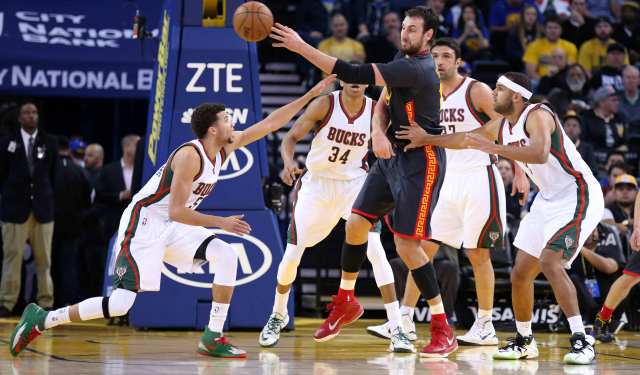
III. “What Larry did is an even tougher thing than what most people could do.”
I know being a player is demanding with all the traveling and the scrutiny, but how do you manage not to just fall into a basketball-only bubble?
I try to do different things. I stay in touch with a lot of people in Australia online. The Internet helps a lot. I’m online a lot just reading things from Australia. I’m involved in property back home in Melbourne a little bit from time to time. I just like studying different things. I did a finance course two years ago, I went back to school to manage my own finances. So I would say the way I get away from it is just managing my everyday life like any average Joe would. I pay my own bills and do my own banking and do my own investments, so that takes up a fair bit of time daily and just makes me feel normal.
You reached out to Larry Sanders to wish him well. What’d you think of his video? Do you think that’s a message that needs to get out a little bit more — that basketball isn’t the only thing that you guys care about?
It’s a tricky one because we’re paid a significant amount of money to play basketball and most people that support the game are passionate about it, they’d love to do what we’re doing. So for someone to come out and say that it’s my job, people probably can’t relate to it as much. Which is unfortunate. Because it is, it does become a job after a while. I still enjoy it, I think most people that play it enjoy it, but it has its ups and downs.
I think what Larry was trying to say is he doesn’t want basketball to define him, he wants to define himself. And I think that’s when we go back to what guys are doing off the court and all that, you gotta have outlets that aren’t just predicated on basketball because you’ll drive yourself crazy. You’ll get to a point where you retire, and you want to know what happens to a lot of those guys two or three years out of retirement? They get depression and then all hell breaks loose financially and emotionally and socially. So I think he made the right decision.
A lot of people think he’s crazy leaving that money on the table, but mental health is an interesting one. I have some friends and family that had similar issues. And it’s a tough one because you can’t see it. It’s not like a broken leg where you have a cast on and people can feel sorry for you. It’s in your head. And people kind of call you soft and a pussy for it. That’s just the reality of being a professional sportsman. You’re supposed to be tough and be able to fight through anything. But I think what Larry did is an even tougher thing than what most people could do.
The time I spent with Larry, he was a really good teammate. I got along with him just fine. He was a young player, I had no problems with him and I really do wish him the best.
So do you think sometimes the importance of being a well-rounded person — and that includes mental health — can be unfairly overlooked?
100 percent. Because if you got up tomorrow morning and there’s an NBA game on and Joe Blow has missed a game with mental stress, what do you think the reaction would be? It would be outrageous. He would be getting killed on TV. Stephen A. Smith would be having a fit about it on ESPN. People would be going crazy on blogs saying that you make $250,000 a game, how could you not play because you’re mentally stressed? And that’s just the reality of it. It’s something that’s not seen. It’s something that’s seen as soft, especially in men. To come out and say that you’re struggling and stressed is just something that you don’t do, and it’s something that we should embrace a little bit because it can be life-changing. Where you have people committing suicide and doing stupid things. Like I said, people can’t see it so they don’t know how to act about it.
You’ve said you don’t want to have kids until you’re out of the league.
I kind of don’t want to raise them around this environment because I don’t think it’s a healthy environment in a way for children. Because everything’s monetary, everything’s about money and flashiness and what car you drive. Not to disrespect how other people live, but it’s something that I don’t think is appropriate for children. I don’t think a child should have a Louis Vuitton bag at four years old or have a cell phone at six. That’s something I don’t think is right, and it’s not the way I’ll raise my kids the day I have ‘em. Yeah, it’s an interesting one. I’ll just try to keep my kids level-headed and make sure that they work just as hard as I did to get to where they are. There are going to be no free handouts and I’ll want them to have a normal childhood.
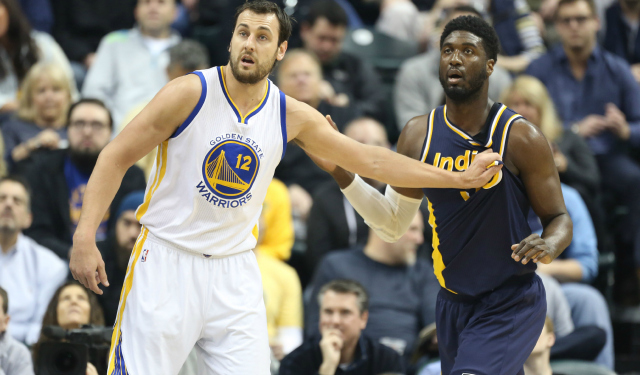
IV. “I thought I should be averaging 20 and 20 to impress everybody.”
You’ve said you were motivated when you were cut by your state team at the age of 15. Do you still look for that kind of motivation, do you want to be slighted or overlooked?
A little bit. My motivation has obviously been my last couple years of luck with injuries. So, motivation for me is to try and play as many games as I can and be on a winning team. And that’s working so far, so touch wood, we can be there at the end. But once you get to 30, 31, the motivations kind of go out the window a little bit. You’re moreso trying to survive day to day, I’d say.
How did you make sense of things when you went from being cut from that team to being a college star in Utah and being compared to Arvydas Sabonis and Bill Walton?
I didn’t. It was a whirlwind. I never really sat down and absorbed it. It was probably something I should have done better. I didn’t really absorb it and enjoy it as much as I could ‘cause I was looking at the next target and the next big tournament or next team or the next person to beat. It kind of went by really quick. I didn’t really take it all in, to be honest. Same as the draft process and same as probably the first five or six years in the league. It just went by so quick.
Can being the No. 1 pick be a burden?
It can, yeah. Look, it was early on. I thought I should be averaging 20 and 20 to impress everybody since I was the No. 1 pick. But I don’t think I was selected to dominate straight away. I probably wasn’t ready for the NBA, to be honest, after my sophomore year. I did everything I could in college, but I knew physically I wasn’t ready. I mean, I was only 235, I was real skinny and light and wasn’t physically ready for the toll it takes on your body. But then my second and third year, I kept getting better and ended up being a double-double guy for a number of years and a defensive force and the rest is history. So as far as No. 1 picks go, I’m definitely not the best but I’m far from the worst.
What’s the biggest thing you’ve overcome?
Two career-ending injuries. So, elbow, was told it would never be the same. Was told it’d be similar to a baseball player, you won’t be able to pitch again. That was pretty tough to hear, that I wouldn’t be the same. So I sort of bounced back from that. Have lost a fair bit of touch with my shot from it, but I’m still here and still playing at a high level. And then the ankle was the same thing. It was like, hey, yeah, you might not be able to explode the same way or move the same way or even play at the same level you were. I’m still here. There are two things that I think resonate — from my childhood, I was told I couldn’t and wouldn’t and shouldn’t — and the same thing happened with those two injuries. And I think that’s a big reason why I’m still playing basketball.
What people don’t see is that, if you have a regular job and someone severs their right arm completely, they’re probably not going to work again for the rest of their life. And I wanted to try and bounce back. And obviously, people are going to say, “Yes, well, you’re making a lot of money and you play in the NBA.” No doubt about that. But I wanted to come back and prove that I could keep playing. The problem is, two months back after the injury, people don’t remember the injury so they’re like, “Why are you playing bad? Why this? Why that?” And that’s just what you have to deal with. So it does take a toll on you both mentally and physically, but I wouldn’t change it for the world. I think the light was at the end of the tunnel for me, coming to the Warriors, one of the worst teams in the league at the time, and then being a part of this process with Steph Curry and Klay Thompson and those guys and now one of the best teams in the league. It’s been a dream come true in a sense.














